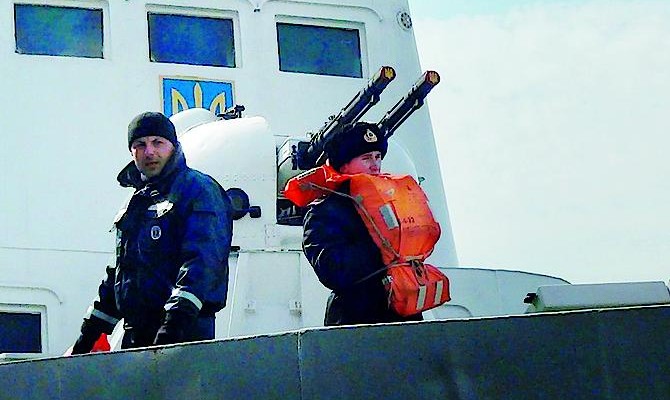Politics
bloсkadeRussian ships may be blocked from entering ports in the Sea of Azov, while Ukrainian ships may be banned from sailing out from these ports

Ukraine’s authorities are considering prohibiting Russian ships from entering Ukrainian ports in the Sea of Azov, Secretary of the National Security and Defense Council (NSDC) Andriy Parubiy stated yesterday. Besides that, the issue of suspending the operation of points of entry of railway and air transport communication from Russia is being considered. Mirror reaction of Russia could deprive Ukraine of main hard currency earnings.
Don’t let them in or out…
On the background of the escalating conflicts with Russia experts are not ruling out the possibility that the aggravation of the transport conflict may force Russia to close off the Kerch Strait, which connects the Sea of Azov with the Black Sea. Back in April of this year the authorities of the Greater Odesa ports – Illyichivsk, Odesa and Pivdenniy – feared such a course of events. Yesterday in talks with a correspondent of Capital the Director of the Center of Political and Economic Analysis Oleksandr Kava pointed that at the moment Russia controls the Kerch Strait and has the capacity to block the passage of certain ships through the strait. Should this happen, the Mariupol and Berdyansk maritime trade ports (MTP) may lose the capacity of cargo transshipment.
Ironclad port
Director of the Center of Transport Strategies project Serhiy Vovk said the Mariupol Port is the most powerful in Ukraine in terms of transshipment of the main cargo, in particular metal, which accounts for a significant share of Ukraine’s hard currency earnings. “This port mostly reloads products of the Illyich Mariupol Steelworks, Azovstal and a number of other metal production facilities. The alternative of logistics through other ports will mean an increase in the price of metal products by US $10-20 per tonne due to the cost of railway transport and that implies that export of Ukrainian goods will no longer be competitive, which is not beneficial to the state,” the expert said.
According to data of the Association of Ukrainian Sea Ports, the Mariupol MTP accounts for 40-50% of export shipments of Ukrainian metal products (in January-May 2014 the port shipped abroad 3.6 mn t of Ukrainian metal products), which amounted to approximately 47% of all domestic metal export).
The Greater Odesa ports could become an alternative to the port in Mariupol, however the expenses for the shipment of cargo from the Donetsk oblast to the Odesa oblast could mean additional costs. “The option of logistics through other ports would mean a considerable increase in production costs which will be reflected in the price of products,” said Vovk. Earlier, expert at the Center of Transport Strategy Andriy Isayev assessed the additional costs of cargo shippers in the event of reorientation of cargo from the port in Mariupol to Black Sea ports at US $7-15/t. Given this, it is quite easy to calculate the financial losses of shippers that use the capacities of the ports in Mariupol and Berdyansk: in 2013 these ports processed 16 mn t of export cargo.
Specialists of the international transport logistics holding company AsstrA informed Capital that for certain cargo the expenses will be double the amount: for example, if to shift the shipment of metal products from Mariupol to ports in Greater Odesa, an additional UAH 357/t will have to be spent and if to the port in Mykolayiv – an additional UAH 284/t.
All roads lead to Odesa
After the occupation of Crimea the ports on the peninsula lost a significant part of Ukrainian cargo, which was transferred to other ports. “In Mykolayiv and Odesa the cargo turnover increased due to the switching of cargo flows from ports in Crimea, which is why the current situation is quite intense,” Vovk said.
Be that as it may, the share of cargo shipped to the ports in Mariupol and Berdyansk is much higher than that to the ports of the Sea of Azov. Around 10% of the cargo goes through the port in Mariupol out of the total volume of transshipment in 2013, while all ports in Crimea accounted for 9% of shipments over the same period. “For this reason, the ports in the Sea of Azov will sustain a greater blow than those in Crimea in case of their closure,” Vovk concluded.
At this point, it is difficult to say how much capacities these ports have. The Association of Ukrainian Sea Ports did not respond to the same question posed by Capital.
What’s on the horizon?
Notwithstanding the harsh statements of the Ukrainian government, experts at this point do not see and pretenses for closure of the Russian part of the Kerch Straits. “Until recently, I did not see a single statement by the Russian side that they will close navigation through the Kerch Straits. I do not think that the Russian would go for this without a dire need. From the point of view of general security, the situation in Crimea is at the moment peaceful, there are no threats to navigation and there are also no precepts for closure of the straits,” Vovk believes.
At the same time, although there are not many ships sailing under the Russian flag, the closing of ports in the Sea of Azov could only exacerbate the current situation even more.






 of the agreement of syndication with Financial Times Limited are strictly prohibited. Use of materials which refers to France-Presse, Reuters, Interfax-Ukraine, Ukrainian News, UNIAN agencies is strictly prohibited. Materials marked
of the agreement of syndication with Financial Times Limited are strictly prohibited. Use of materials which refers to France-Presse, Reuters, Interfax-Ukraine, Ukrainian News, UNIAN agencies is strictly prohibited. Materials marked  are published as advertisements.
are published as advertisements.